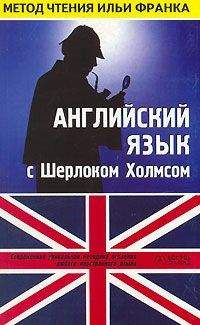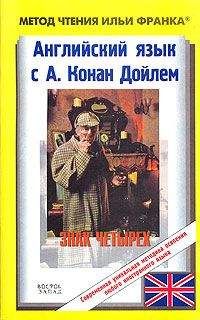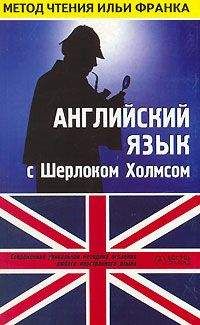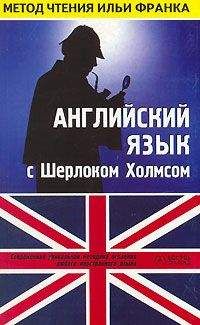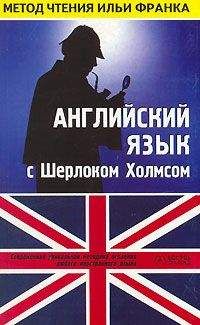breathe [bri:ð], bureau [ˈbju(ǝ)rǝu], thoroughly [ˈƟʌrǝlɪ]
“I determined, therefore, that for the next few days I would always carry the case backward and forward with me, so that it might never be really out of my reach. With this intention, I called a cab and drove out to my house at Streatham, carrying the jewel with me. I did not breathe freely until I had taken it upstairs and locked it in the bureau of my dressing-room.
“And now a word as to my household, Mr. Holmes, for I wish you to thoroughly understand the situation. My groom and my page sleep out of the house, and may be set aside altogether. I have three maid-servants who have been with me a number of years and whose absolute reliability is quite above suspicion.
“Another, Lucy Parr, the second waiting-maid (еще одна, Люси Парр, младшая горничная; second — второй; подчиненный), has only been in my service a few months (на службе у меня только несколько месяцев). She came with an excellent character, however (однако она пришла с прекрасной рекомендацией), and has always given me satisfaction (и я всегда был удовлетворен ее работой: «всегда давала мне удовлетворение»). She is a very pretty girl and has attracted admirers (она очень хорошенькая девушка и привлекла поклонников = у нее есть поклонники; admirer — поклонник; кавалер, воздыхатель; to admire — восхищаться, восторгаться) who have occasionally hung about the place (которые околачиваются возле дома; occasionally —изредка; время от времени to hang about — бродить вокруг; околачиваться). That is the only drawback which we have found to her (это единственный недостаток, который мы в ней нашли), but we believe her to be a thoroughly good girl in every way (но мы считаем, что она вполне порядочная девушка во всех отношениях).
“So much for the servants (это все, что касается слуг). My family itself is so small that it will not take me long to describe it (моя собственная семья настолько мала, что ее описание не займет много времени). I am a widower and have an only son, Arthur (я вдовец, у меня есть единственный сын, Артур). He has been a disappointment to me, Mr. Holmes (он обманул мои надежды, мистер Холмс; disappointment — разочарование, досада; обманутая надежда) — a grievous disappointment (горько обманул; grievous — печальный, скорбный; to grieve — огорчать, глубоко опечаливать; горевать). I have no doubt that I am myself to blame (несомненно, я сам виноват: «меня самого следует винить»; to blame — винить). People tell me that I have spoiled him (говорят, что я его избаловал). Very likely I have (очень может быть). When my dear wife died I felt that he was all I had to love (когда моя дорогая жена умерла, я понял, что мой сын — моя единственная привязанность: «все, что у меня есть, чтобы любить»). I could not bear to see the smile fade even for a moment from his face (я не мог вынести, чтобы улыбка исчезла с его лица даже на миг = не мог вынести даже минутного его неудовольствия; to fade — вянуть; исчезать). I have never denied him a wish (я ни в чем ему не отказывал: «никогда не отказывал ему ни в одном желании»; to deny — отрицать; отказывать). Perhaps it would have been better for both of us (быть может, для нас обоих было бы лучше) had I been sterner, but I meant it for the best (если бы я был строже, но я хотел как лучше).
always [ˈɔ:lwǝz], widower [ˈwɪdǝuǝ], son [sʌn], denied [dɪˈnaɪd]
“Another, Lucy Parr, the second waiting‑maid, has only been in my service a few months. She came with an excellent character, however, and has always given me satisfaction. She is a very pretty girl and has attracted admirers who have occasionally hung about the place. That is the only drawback which we have found to her, but we believe her to be a thoroughly good girl in every way.
“So much for the servants. My family itself is so small that it will not take me long to describe it. I am a widower and have an only son, Arthur. He has been a disappointment to me, Mr. Holmes — a grievous disappointment. I have no doubt that I am myself to blame. People tell me that I have spoiled him. Very likely I have. When my dear wife died I felt that he was all I had to love. I could not bear to see the smile fade even for a moment from his face. I have never denied him a wish. Perhaps it would have been better for both of us had I been sterner, but I meant it for the best.
“It was naturally my intention that he should succeed me in my business (моим намерением, естественно, было, чтобы Артур продолжил мое дело; to succeed — следовать за; сменять /кого-либо/; наследовать, быть преемником), but he was not of a business turn (но он оказался не делового склада). He was wild, wayward, and, to speak the truth (он был необузданным, своенравным, и, по правде говоря), I could not trust him in the handling of large sums of money (я не мог бы доверить ему крупные суммы денег; handling — обхождение, обращение /с кем-либо/; to handle smth. — обращаться с чем-либо). When he was young he became a member of an aristocratic club (когда он был юным = юношей, он стал членом аристократического клуба), and there, having charming manners (и, обладая обаятельными манерами), he was soon the intimate of a number of men with long purses and expensive habits (вскоре стал своим в кругу людей богатых и расточительных: «с длинным кошельком и дорогими привычками»; intimate — близкий, задушевный друг; лицо, пользующееся доверием кого-либо; приятельский, близкий). He learned to play heavily at cards and to squander money on the turf (он пристрастился много играть в карты и проматывать деньги на скачках; heavily — тяжело; сильно, много, интенсивно: to lose heavily — много проигрывать; to drink heavily — сильно пить; turf — дерн; торф; беговая дорожка /ипподрома/; скачки), until he had again and again to come to me (пока не был вынужден снова и снова приходить ко мне) and implore me to give him an advance upon his allowance (и умолять меня дать ему денег в счет /будущих/ карманных расходов; allowance — довольствие, содержание; карманные деньги), that he might settle his debts of honor (чтобы он мог расплатился с карточными долгами; a debt of honour — долг чести /обычно о карточном долге/; to settle — уладить). He tried more than once to break away from the dangerous company which he was keeping (он пытался неоднократно: «больше, чем один раз» порвать с этой опасной компанией; to keep someone company — составить кому-либо компанию), but each time the influence of his friend, Sir George Burnwell (но каждый раз влияния его друга, сэра Джорджа Бэрнвелла), was enough to draw him back again (было достаточно, чтобы вернуть его обратно; to draw back — брать назад, отодвигать назад).
intimate [ˈɪntɪmɪt], squander [ˈskwɔndǝ], implore [ɪmˈplɔ:], draw [drɔ:]
“It was naturally my intention that he should succeed me in my business, but he was not of a business turn. He was wild, wayward, and, to speak the truth, I could not trust him in the handling of large sums of money. When he was young he became a member of an aristocratic club, and there, having charming manners, he was soon the intimate of a number of men with long purses and expensive habits. He learned to play heavily at cards and to squander money on the turf, until he had again and again to come to me and implore me to give him an advance upon his allowance, that he might settle his debts of honor. He tried more than once to break away from the dangerous company which he was keeping, but each time the influence of his friend, Sir George Burnwell, was enough to draw him back again.
“And, indeed, I could not wonder (на самом деле меня не удивляло) that such a man as Sir George Burnwell should gain an influence over him (что такой человек, как сэр Джордж Бэрнвелл, приобрел на Артура влияние), for he has frequently brought him to my house (так как мой сын часто приводил его в мой дом), and I have found myself that I could hardly resist the fascination of his manner (и я сам убедился, что едва могу сопротивляться обаянию его манер). He is older than Arthur (он старше Артура), a man of the world to his finger-tips (светский человек до мозга костей: «до кончиков пальцев»), one who had been everywhere, seen everything (который везде побывал, видел все), a brilliant talker (блестящий собеседник), and a man of great personal beauty (и очень привлекательной наружности: «мужчина большой личной красоты»). Yet when I think of him in cold blood (но все же, думая о нем спокойно/хладнокровно), far away from the glamour of his presence (вдали от обаяния его общества: «присутствия»), I am convinced from his cynical speech (я убеждаюсь, судя по его циничным высказываниям) and the look which I have caught in his eyes (и взгляду, который я замечал в его глазах) that he is one who should be deeply distrusted (что этому человеку вообще нельзя доверять: «что это такой человек, которому нужно оказывать глубокое недоверие»; to distrust — доверять; сомневаться; подозревать). So I think, and so, too, thinks my little Mary (так думаю я и так же считает моя маленькая Мэри), who has a woman’s quick insight into character (обладающая живой женской интуицией, когда дело касается человеческого характера; insight — понимание; проницательность; способность проникновения в сущность: a man of insight — проницательный человек; insight into human character — способность понять /постигнуть/ человеческий характер; quick — быстрый, скорый; живой, чувствительный).
frequently [ˈfri:kwǝntlɪ], beauty [ˈbju:tɪ], cynical [ˈsɪnɪk(ǝ)l]
“And, indeed, I could not wonder that such a man as Sir George Burnwell should gain an influence over him, for he has frequently brought him to my house, and I have found myself that I could hardly resist the fascination of his manner. He is older than Arthur, a man of the world to his finger-tips, one who had been everywhere, seen everything, a brilliant talker, and a man of great personal beauty. Yet when I think of him in cold blood, far away from the glamour of his presence, I am convinced from his cynical speech and the look which I have caught in his eyes that he is one who should be deeply distrusted. So I think, and so, too, thinks my little Mary, who has a woman’s quick insight into character.
“And now there is only she to be described (теперь осталось описать лишь ее). She is my niece (это моя племянница); but when my brother died five years ago (когда мой брат умер пять лет назад) and left her alone in the world I adopted her (и она осталась одна на /всем/ свете, я удочерил ее), and have looked upon her ever since as my daughter (и с тех пор считал ее своей дочерью). She is a sunbeam in my house (она — солнечный луч в моем доме) — sweet (ласковая), loving (нежная), beautiful (прекрасная), a wonderful manager and housekeeper (замечательная хозяйка; housekeeper — домашняя хозяйка), yet as tender and quiet and gentle as a woman could be (и вместе с тем такая мягкая, чуткая и добрая, какой только может быть женщина). She is my right hand (она моя правая рука). I do not know what I could do without her (не знаю, что бы я без нее делал). In only one matter has she ever gone against my wishes (только в одном она пошла против моей воли). Twice my boy has asked her to marry him (дважды мой мальчик просил ее руки), for he loves her devotedly (так как он нежно, самозабвенно любит ее; to devote — посвящать /себя чему-то возвышенному/; уделять, жертвовать /время, деньги/), but each time she has refused him (но каждый раз она отказывала ему). I think that if anyone could have drawn him into the right path it would have been she (я думаю, что если кто-то и мог бы направить Артура на путь истинный, так это она), and that his marriage might have changed his whole life (и что брак с ней мог бы изменить всю его жизнь); but now, alas! it is too late — forever too late (но теперь, увы, слишком поздно — навсегда = и никогда этому не бывать)!
